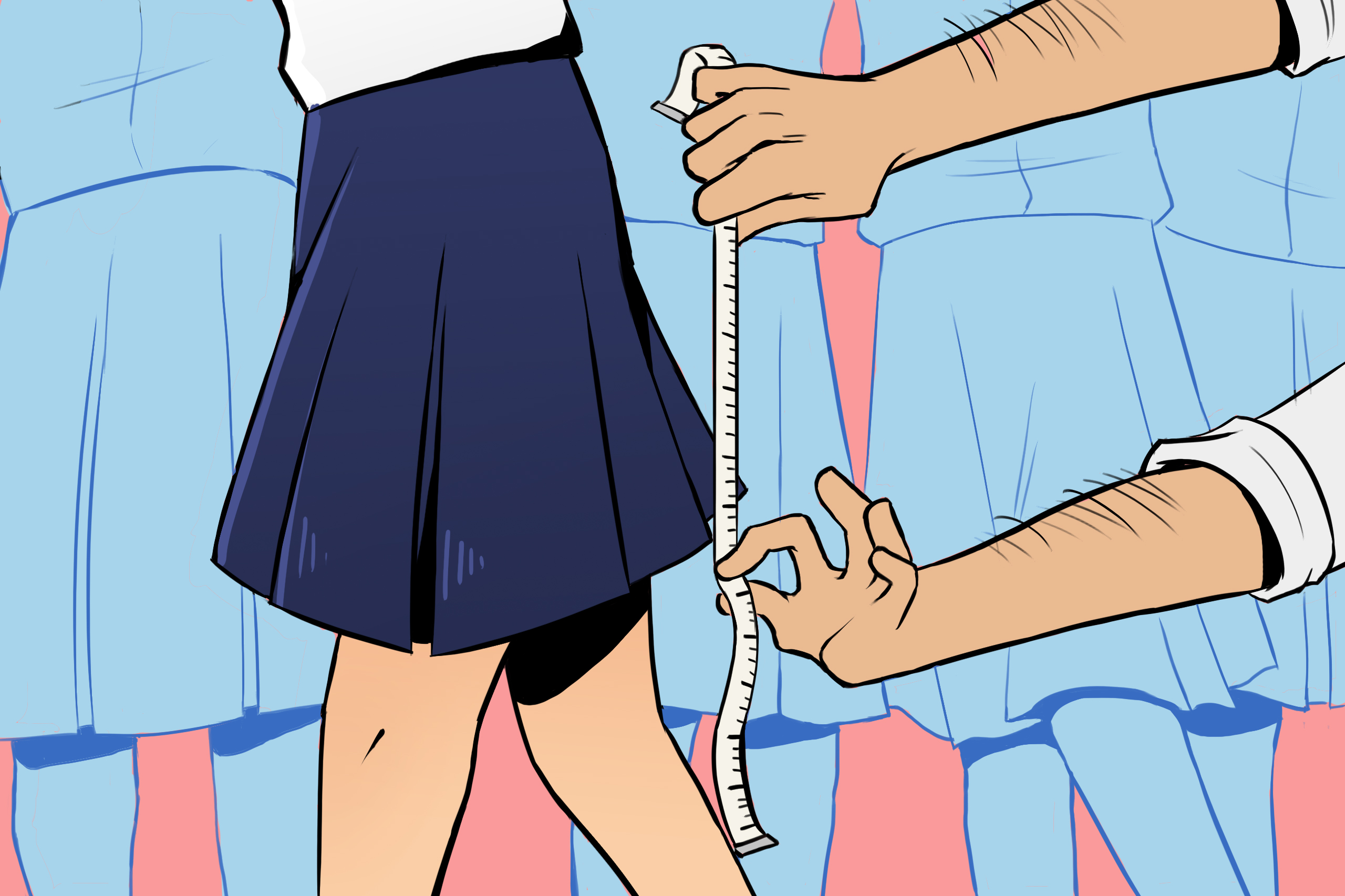Late last month, Nanyang Girls’ High School (NYGHS) found itself in the spotlight for an unusual reason: an attire check taken too far. According to reports carried by the Straits Times and Shin Min Daily News, a teacher purportedly “undid the collar buttons of students’ uniforms and pulled out their bra straps” while carrying out the inspection, checking for brightly-coloured bra straps which contravened the school’s uniform policy (which only allows white or beige bras).
On reading the article, my initial reaction was somewhere between outrage and exasperation. How awful, I fumed. How inappropriate and excessive. Also: how lame. Why are we still policing what girls can or can’t wear? Aren’t there other things more worth caring about?
But when the first flame of indignation had burned itself out, something else came seeping through in its wake: a haze of sun-drenched afternoons in stuffy classrooms, of rumpled pinafores and regulation school socks, of shrieking laughter and crippling awkwardness, of training bras and chunky white trainers (long before they became fashionable).
Not so very long ago, all these things were not yet memories, but life as I knew it.
It makes no sense to tell girls one minute that your character, not your appearance, is what truly matters, then imply in the next that no one will respect you if you have hot pink bra straps.
Put another way, this meant that as an adolescent girl—when I was still growing into my own voice and body, but before I’d learned how to become a woman—the chorus around me was almost entirely female. I had never thought of it as such, or thought of it as unusual, until I sat down to write this article.
In the wake of the NYGHS incident, reflecting on the impact my education had on my personal growth, especially concerning my womanhood, body image, sexuality, and relationships, has been difficult. Not just because of the ten years which have passed since I graduated, or the layers of experiences which have accumulated in that time, but because it turned out to be far more bittersweet and complex than I ever gave it credit for being.
How do you even begin to talk about something so formative, and so intrinsically part of who you are?
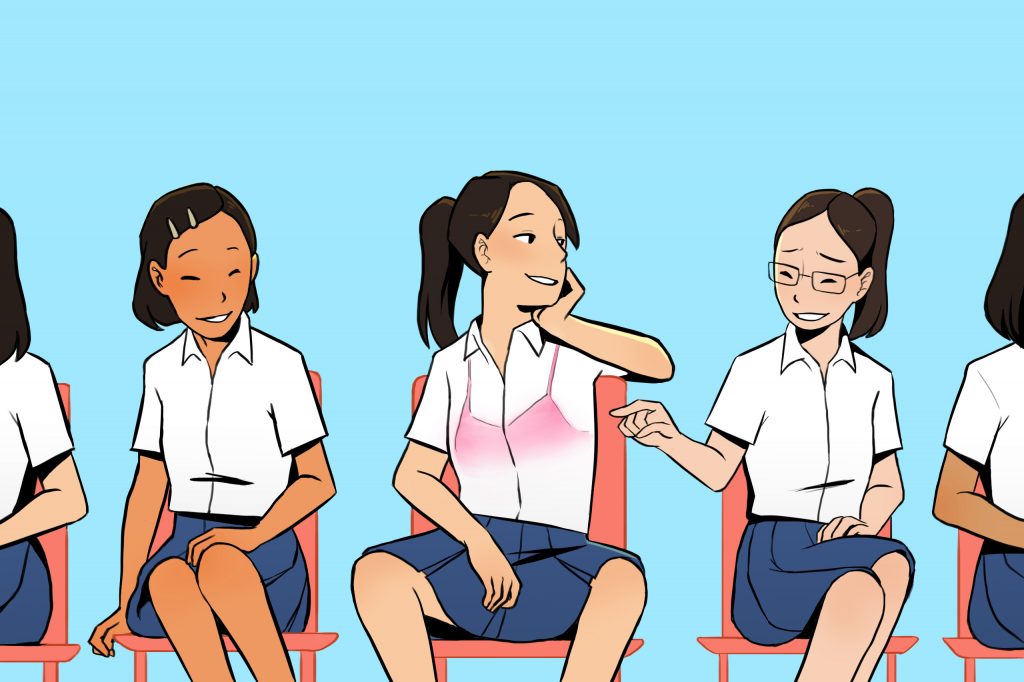
That being said, incidents like the NYGHS attire check speak to a less-acknowledged aspect of girls’ schools: that teachers, however well-meaning, sometimes encourage problematic assumptions about how girls should dress and behave.
Amanda*, who attended Katong Convent, recalled the following incident: “Whenever we had PE, we’d wear our PE attire under our pinafores, and when it was time for PE or whatever sporting activity we’d just take our pinafores off and start running or whatever. I remember during one assembly, Ms S* told us something like not to take off our pinafores in public because it gave other people the chance to imagine us undressing … she was saying that even if you wear shorts, the mere act of taking off that top layer will lead to other people (especially boys) imagining that you’re undressing.”
“At the time I was like, oh man, really? It actually stayed with me for a while, to the point that when I was in JC and I had to remove a pullover I was wearing over my uniform, I’d try to do it discreetly,” she added. It took her years to stop feeling self-conscious about this.
Amanda’s example might be an extreme one, but every girl will have heard some variation on it.
“Close your coffeeshop,” and sit like a lady; keep your bra straps out of sight; make sure your skirt’s not too short or you’ll look like a prostitute. Strictures like these go beyond ensuring students look neat and presentable. They are value judgments that are grounded in, and ultimately perpetuate, gender stereotypes that are unhelpful at best and dangerous at worst—that your attire is reflective of your character or virtue; that female sexuality is something to be denied or embarrassed about; that girls and young women are responsible for protecting boys from their imaginations.
None of this is to say that similar attitudes don’t exist in co-ed schools, but in the context of an all-girls environment, the ‘boys will stare’ argument is an odd one to employ. They also sit uncomfortably with the other important messages that girls’ schools stand for.
I have no doubt that our teachers meant well, and were perhaps only repeating what they’d been told themselves. But it makes no sense to tell girls one minute that your character, not your appearance, is what truly matters, then imply in the next that no one will respect you if you have hot pink bra straps.
To be fair, I doubt any of us took comments like these as pronouncements about femininity at the time. My friend Joy*, a former Singapore Chinese Girls’ School student, recalled how she once got reprimanded by her principal for wearing a cross-back sports bra under her PE attire.
“I was scared and embarrassed, but more scared that I was going to be booked rather than anything else … I don’t think it really affected the way I saw my body, because my friends all agreed this was a ridiculous rule, and sports bras were still our favourite (and most functional) bras,” she said.
Moreover, most teenage girls would find it infinitely more distressing to be found wanting in the eyes of their peers than to be hauled up by the discipline mistress. We didn’t always care for what authority figures had to say, and here, this probably worked to our benefit.
Nonetheless, in my twenties, and with the benefit of being better informed about issues like consent and violence against women, it’s hard not to see comments like this as problematic. Saying that bra straps should be concealed from prying eyes, or hems kept at a certain length to ward off upskirters, implies that the onus is on girls to protect themselves against sexual harassment or assault.
It’s also the same kind of language that enables silence and shame around these issues to endure. What sounded like just another lecture at the time was really part of a wider culture of victim-blaming, with far graver consequences than we could ever have foreseen from the safety of our classrooms.
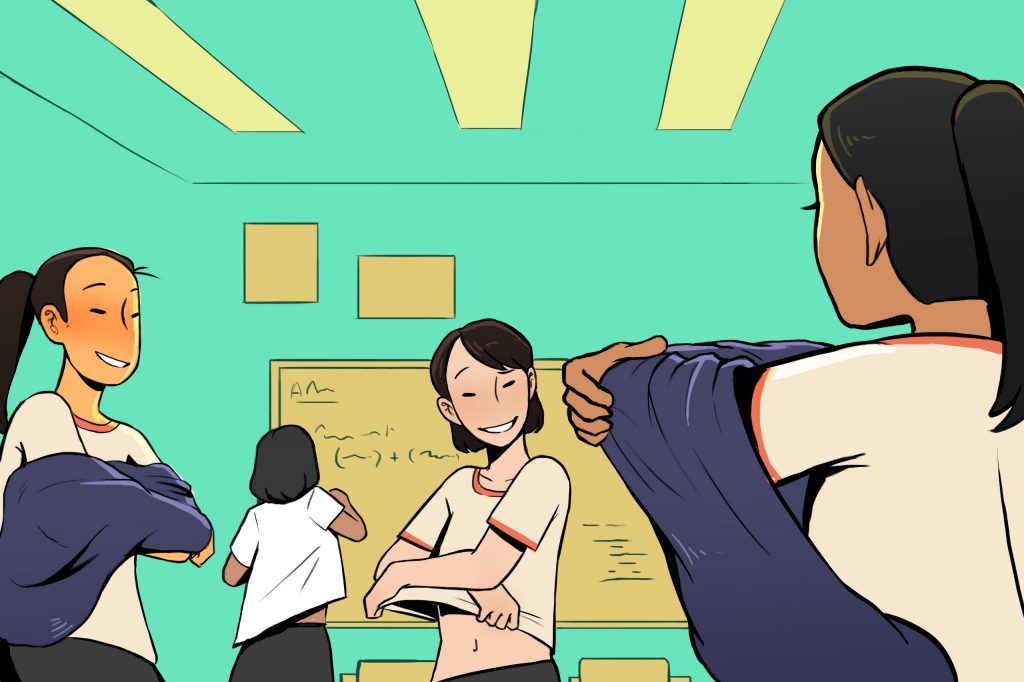
In one memorable incident from junior college, my form teacher once implored my female classmates (nearly all of whom had also gone to girls’ schools) and I to be more self-aware. In her words, spoken half in jest and half in despair, we were all “nubile young women” who had no idea of our own allure. Of course, none of us took her seriously at the time; we were too busy falling over each other in hysterics at being called ‘nubile’.
However amusing her choice of words, Ms C had a point: having grown up largely outside the male gaze, few, if any, of us had any real concept of our sexuality, or how to approach relationships—whether platonic or romantic—with the opposite sex in a healthy fashion (in this, I can only speak to my experiences as a straight woman).
We might not have been completely innocent about boys and dating, but there is a vast gulf between knowledge of these things in the abstract, and understanding how the intricacies of attraction, desire, and power can play out in practice.
In fairness, these would be difficult concepts for any teenager to grasp; at 26, there is so much I’m still figuring out. But growing up almost exclusively around other girls meant that till I entered junior college, what I knew of boys was based on the idea of them, rather than the reality. All I had to go on came from television and Seventeen, second-hand whisperings, or warnings from well-meaning adults, with minimal lived experience to help separate reality from fiction or cliche.
At the same time, informed, nuanced discussion of topics like sexuality and relationships—or more accurately, any discussion at all—was non-existent. My secondary school friends and I had no idea where to begin, and our teachers never stepped in to encourage this, such talk being deemed either incompatible with being a demure, modest schoolgirl, or dismissed on the basis that to talk about sex was to condone having it.
Either way, neither was helpful in preparing me for the reality of late adolescence (in Britney Spears’ immortal words, not a girl, not yet a woman): addressing my changing relationship with my body, navigating the politics of dating, or even enjoying meaningful, platonic, mixed-sex friendships. I’m not sure that co-ed schools are necessarily better at preparing their students for these, but the particular combination of growing up only around other girls, coupled with the absence of any meaningful conversation around sexuality, indulges the curious fiction that one can be a woman and never have to contend with the power and vulnerability of your body, or recognise it as both agent and object of desire.
My friend Anabelle*, an alumna of Cedar Girls’ School, concurred.
“I guess we really grew up in a bubble when it came to the male gaze, going to an all girls’ school,” she said. Referencing the recent reports of an explicit video of a schoolgirl with an adult man being circulated online, she said, “The thought of men being turned on by school uniforms didn’t even cross my mind [at the time].”
It had never crossed mine either. Anabelle and I may not have been “totally unprepared to face the world of men”, as the teenaged Liesl sang in The Sound of Music, but nor were we far off. For all that things turned out fine—we became accustomed to men in our own time, and have enjoyed healthy, positive relationships—this also feels like a matter of luck, given how sheltered we were at the outset. For this reason, the language of empowerment so proudly adopted in girls’ schools now rings a little hollow for me, realising it never gave me the vocabulary to articulate so many critical parts of womanhood.
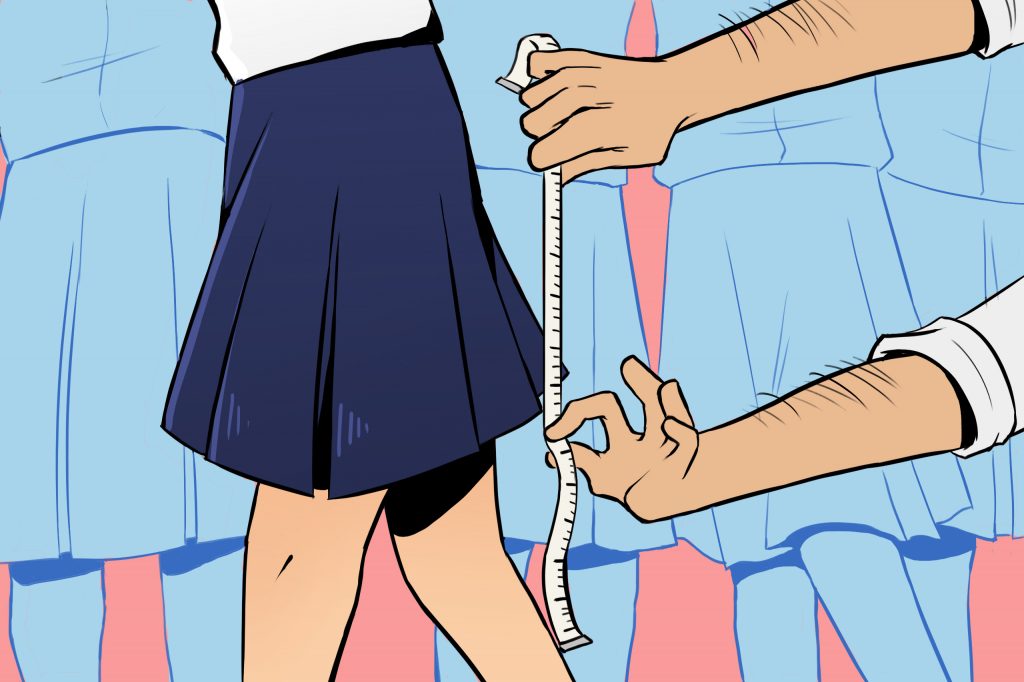
It is difficult to overstate what a gift this was. Now in my twenties, being a woman often feels exhausting (and I say this from a position of privilege as a straight, able-bodied, middle-class, Chinese ciswoman). You spend obscene amounts of time politely smiling through advice about how you should sit, stand, smile, eat, dress, exercise, wear your hair, decorate your house, treat your in-laws, raise your children, and a million and one other things which are nobody’s business but your own. Everything you do is filtered against somebody else’s ideal of how a woman should be. The rest of your time is spent torn between wanting to scream, and feeling hopelessly inadequate about all the ways you think you will never measure up.
All this makes me incredibly nostalgic for my school days, when my peers and I, for all the grouses I detailed above, still enjoyed a remarkable degree of freedom from gendered expectations regarding our capabilities or conduct.
Without boys around, we saw no reason to conform to what we thought they wanted us to be, to censor our opinions or filter our speech. At the time, it never crossed my mind—nor, I’m sure, any of my peers’—to temper my conduct to appear more ‘feminine’, or dumb myself down to avoid appearing intimidating. Long before we became acquainted with the glass ceiling, or the politics of likeability, we ran for leadership roles because we wanted them, without fear of being called bossy or nasty or too much.
Without boys around, we carried our own books and helped teachers with heavy boxes, stacked up towers of chairs after assembly, took on male roles in drama productions without reluctance or embarrassment. Clara*, a former Raffles Girls’ School student, recalled taking ballroom dance classes in school, where the taller girls would learn the steps typically done by male dance partners.
“Our femininity was reinforced in some instances—we did have one-off lessons on personal grooming and dining etiquette as part of our post-exam activities—but we could always play the male role if the situation demanded it.”
None of us were ever told that girls were less talented at maths and science, or that we ran/threw/sat like a girl (and if we had, we would have failed to see why this was an insult). The resultant diversity of personalities, talents, interests, and experiences around me showed me, from a very young age, that there was no one way of being a girl.
Additionally, and significantly, we were refreshingly uninhibited when it came to talking about our bodies amongst our peers. This is not to say that we were immune from external pressures about how girls’ bodies should look or smell or feel; against these there is no impregnable fortress, not even a girls’ school. But within those walls, without boys around to make us self-conscious, very little was off-limits.
Amanda, who shared the anecdote about being lectured not to ‘undress’, fondly recalled coming back to school after the December holidays and hugging a friend, who exclaimed, “Wow, your boobs grew!”. With no boys around, we used our classrooms as communal changing rooms, taking our time to get dressed after PE, often using this as an excuse to delay the start of the next lesson for as long as we could.
In this vein, we had no boundaries when it came to talking about our periods. It was not uncommon for someone to yell “WHO’S GOT A PAD?” and then be pelted by a shower of them being thrown from across the classroom. We would gleefully compare details of our cycles – “Are you bleeding?” “I’m bleeding too!” – and were always ready with Panadol and a sympathetic wince when a friend had cramps.
When everyone around you treats an experience as normal, it removes any room for stigma or shame. For this reason, it never occurred to me to avoid bringing up my period in front of male friends, or that girls who grew up in co-ed schools did not share the same experiences. In junior college, when my friend Christine*, who also attended a girls’ school, and I were having our periods, we’d hug each other and wail, “I’m haemorrhaging”, ignoring the bemused stares of male classmates (who, in time, went from mildly grossed out to curious to sympathetic to indifferent).
It was only after I graduated that I realised many men, and some women, maintained a taboo around menstruation. Given how candid discussions about women’s health are still relatively rare, and awareness of conditions like endometriosis and PCOS (polycystic ovary syndrome) remains low, I can’t help but feel grateful having grown up as I did: to never have felt ashamed about my lady parts, and to have felt able to speak about them at all.
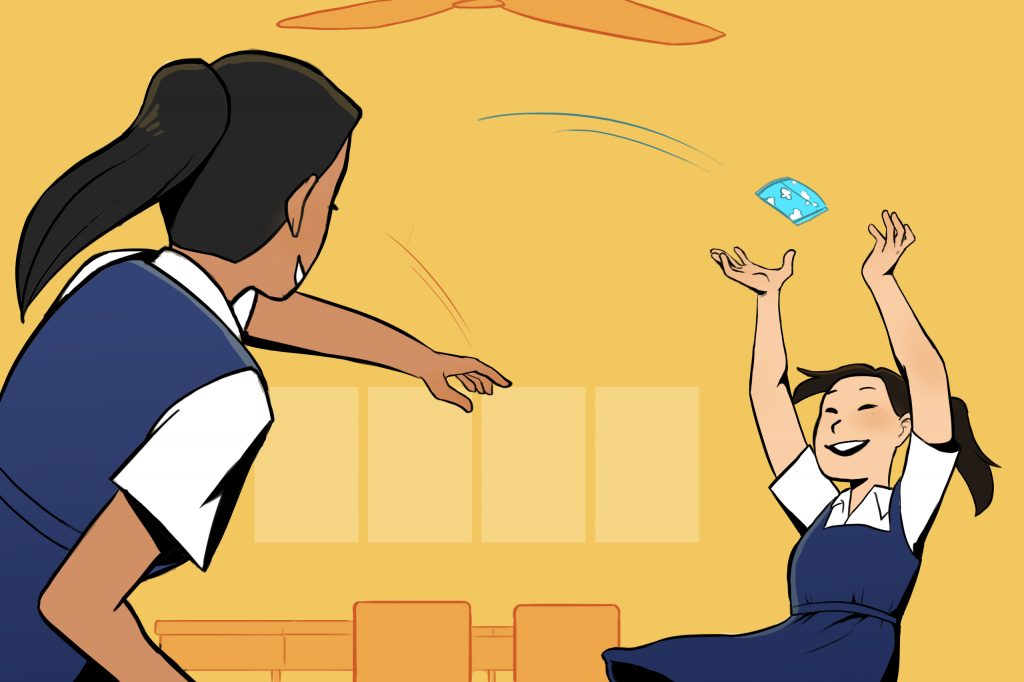
There is so much I appreciate about my girls’ school days, and so much I wish had gone differently; so much I wish I had known then, and so much about them that I miss. My affection for those days is inseparable from my frustration for how they failed to prepare me for some vital aspects of womanhood; my gratitude and pride in its many positive aspects is tempered by the realisation of what it lacked.
Nostalgia is the world’s best image enhancer, and the messiness of adulthood often makes the joys of adolescence shine all the brighter. Take me back, we say, I miss things being simpler. But when I look back on my 16-year-old self – “standing on an empty stage / waiting for fate to turn the light on”, just like Liesl in the song – I realise that her education, and the legacy it left her, was never simple or clear at all. It was, in fact, nearly as complicated as being a woman would be.
